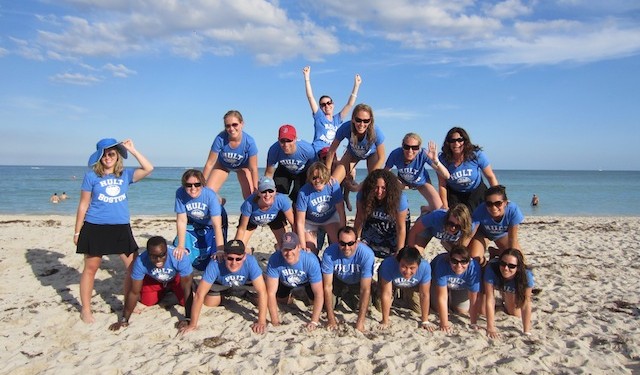A benefit of such gatherings is that they unite teams of staff spread across borders and time zones – an important way to show employees the bigger picture to which they belong. Global Village English Centres, for example, uses its bases across Canada and the US for motivational staff retreats and meetings.
News and business analysis for Professionals in International Education
Have some pie!
How do companies in our sector build staff loyalty?
 Staff form Hult International Business School's Boston campus on an employee trip. The firm uses regular trips, training exercises and other measures to keep its staff around the world motivated and engaged.
Staff form Hult International Business School's Boston campus on an employee trip. The firm uses regular trips, training exercises and other measures to keep its staff around the world motivated and engaged. “We have had the sales and marketing staff rent a house on the sunshine coast one hour from Vancouver to develop marketing collateral,” says company president and MD Robin Adams. “In December I met with all the directors of our schools at our school in Hawaii and this was an amazing productive place to work.”
Others use alternative methods to foster global inclusivity, such as Navitas with its Global Corporate Challenge – a 16-week health and exercise programme, in which more than 350 staff participate from around the world. “It really helped to foster a sense of inclusion and teamwork among participants, as well as some friendly competition,” says Jones.
While such measures may bring staff closer together, they do not replace tangible efforts to build skills and career prospects – key to keeping employees loyal and motivated. Many companies say incentives such a bonuses and internal promotion are important in this regard; others cite industry-specific perks, such as being given the opportunity to work in a foreign branch.
Navitas has its Global Corporate Challenge – a 16-week health and exercise programme, in which more than 350 staff participate
Training is also vital, simultaneously keeping staff happy while fortifying a company. Hult offers a good example with its yearly professional development training sessions, which encompass teamwork and individual development components.
CES meanwhile pays for staff to take DELTAs, workshops and other development programmes. ELS also offers many scholarships for instructors to pursue higher teaching credentials and even co-runs a degree programme which staff can access at a discount. Added to this it pays membership to TESOL for select job roles and recognises employee excellence through its Excellence in Teaching Awards.
Despite the reams of literature available on corporate motivation, it remains an inexact science, and it is hard to measure how much difference it makes to employees and employers. However, all the companies that participated in this article said that their motivation strategies were paying off.
Navitas for example, claims a high 80% of its staff feel a sense of accomplishment from their work. The Centre of English Studies meanwhile says the training it offers can prevent teachers from flitting between countries and schools – a perennial challenge in the ELT industry.
“Hawaii was an amazing productive place to work”
Safe to say, as international education grows and staff become evermore important assets to companies, investment in motivation will continue apace. “A person is more likely to stay with an organisation if they have a good manager who they believe is contributing to their professional development, and they are more likely to leave if they don’t feel their manager is investing in them,” Bergland surmises. “So investment is essential, whether or not we are in a growth phase.”
Still looking? Find by category:




Rod Jones says “annual meetings which offer a great way to “talk about the wider environment for Navitas and where we are headed.”
Rod Jones says “the English Division’s annual Big Day In, brings staff from across Australia together for training, networking, guest speakers and presentations. It has been running for 18 years and is “a highlight of the year for many staff.”
Staff working for the company say “the big-wigs have no idea about the mostly negative impact that all of their ‘grand ideas’ and measures have on staff motivation. They don’t know what we do and talk down to us about things like ‘coping with change’ – I’m a freaking teacher who deals with change every mintue of my working day, don’t tell me how to adapt!”
I am the Director of operations at a SEDA in Dublin Ireland. The importance of creating organisational Identity for staff members as a motivational tool seems to be lost on some members of management. I have long been an advocate of utilizing incentives such as social events, team building exersises and developmental programs so that teachers will not only want to be identified with our academy but fell apart of the SEDA family. They in turn will become part of our marketing team in that they will actively engage and promote the school not only to existing students but to others through social media sites.